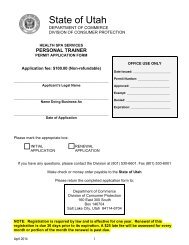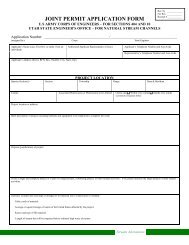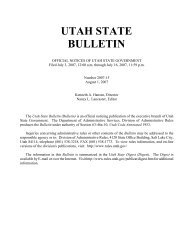Vol. 2010, No. 11 (06/01/2010) PDF - Administrative Rules - Utah.gov
Vol. 2010, No. 11 (06/01/2010) PDF - Administrative Rules - Utah.gov
Vol. 2010, No. 11 (06/01/2010) PDF - Administrative Rules - Utah.gov
Create successful ePaper yourself
Turn your PDF publications into a flip-book with our unique Google optimized e-Paper software.
DAR File <strong>No</strong>. 33650<br />
NOTICES OF PROPOSED RULES<br />
procurement officer and, in addition, may provide for payment of a<br />
fee. The contractor agrees to perform as specified in the contract<br />
until the contract is completed or until the costs reach the specified<br />
ceiling, whichever occurs first.<br />
This contract type is appropriate when the uncertainties<br />
involved in contract performance are of a magnitude that the cost of<br />
contract performance cannot be estimated with sufficient<br />
reasonableness to permit use of any type of fixed-price contract. In<br />
addition, a cost-reimbursement contract necessitates appropriate<br />
monitoring by purchasing agency personnel during performance so<br />
as to give reasonable assurance that the objectives of the contract<br />
are being met. It is particularly suitable for research, development,<br />
and study-type contracts.<br />
(2) Determination Prior to Use. A cost-reimbursement<br />
contract may be used only when the procurement officer determines<br />
in writing that:<br />
(a) a contract is likely to be less costly to the purchasing<br />
agency than any other type or that it is impracticable to obtain<br />
otherwise, the supplies, services, or construction;<br />
(b) the proposed contractor's accounting system will<br />
permit timely development of all necessary cost data in the form<br />
required by the specific contract type contemplated; and<br />
(c) the proposed contractor's accounting system is<br />
adequate to allocate costs in accordance with generally accepted<br />
accounting principles.<br />
(3) Cost Contract. A cost contract provides that the<br />
contractor will be reimbursed for allowable costs incurred in<br />
performing the contract.<br />
(4) Cost-Plus-Fixed-Fee Contract. This is a costreimbursement<br />
type contract which provides for payment to the<br />
contractor of an agreed fixed fee in addition to reimbursement of<br />
allowable, incurred costs. The fee is established at the time of<br />
contract award and does not vary whether the actual cost of contract<br />
performance is greater or less than the initial estimated cost<br />
established for the work. Thus, the fee is fixed but not the contract<br />
amount because the final contract amount will depend on the<br />
allowable costs reimbursed. The fee is subject to adjustment only if<br />
the contract is modified to provide for an increase or decrease in the<br />
work specified in the contract.<br />
3-704 Cost Incentive Contracts.<br />
(1) General. Cost incentive contracts provide for the<br />
sharing of cost risks between the purchasing agency and the<br />
contractor. This type of contract provides for the reimbursement to<br />
the contractor of allowable costs incurred up to a ceiling amount<br />
and establishes a formula in which the contractor is rewarded for<br />
performing at less than target cost or is penalized if it exceeds target<br />
cost. Profit or fee is dependent on how effectively the contractor<br />
controls cost in the performance of the contract.<br />
(2) Fixed-Price Cost Incentive Contract.<br />
(a) Description. In a fixed-price cost incentive contract,<br />
the parties establish at the outset a target cost, a target profit, a costsharing<br />
formula which provides a percentage increase or decrease of<br />
the target profit depending on whether the cost of performance is<br />
less than or exceeds the target cost, and a ceiling price. After<br />
performance of the contract, the actual cost of performance is<br />
arrived at based on the total incurred allowable cost as determined<br />
in accordance with part 7 of these rules and as provided in the<br />
contract. The final contract price is then established in accordance<br />
with the cost-sharing formula using the actual cost of performance.<br />
The final contract price may not exceed the ceiling price. The<br />
contractor is obligated to complete performance of the contract,<br />
and, if actual cost exceeds the ceiling price, the contractor suffers a<br />
loss.<br />
(b) Objective. The fixed-price cost incentive contract<br />
serves three objectives. It permits the establishment of a firm<br />
ceiling price for performance of the contract which takes into<br />
account uncertainties and contingencies in the cost of performance.<br />
It motivates the contractor to perform the contract economically<br />
since cost is in inverse relation to profit; the lower the cost, the<br />
higher the profit. It provides a flexible pricing mechanism for<br />
establishing a cost sharing responsibility between the purchasing<br />
agency and contractor depending on the nature of the supplies,<br />
services, or construction being procured, the length of the contract<br />
performance, and the performance risks involved.<br />
(3) Cost-Plus Contract with Cost Incentive Fee. In a<br />
cost-plus contract with cost incentive fee, the parties establish at the<br />
outset a target cost; a target fee; a cost-sharing formula for increase<br />
or decrease of fee depending on whether actual cost of performance<br />
is less than or exceeds the target cost, with maximum and minimum<br />
fee limitations; and a cost ceiling which represents the maximum<br />
amount which the purchasing agency is obligated to reimburse the<br />
contractor. The contractor continues performance until the work is<br />
complete or costs reach the ceiling specified in the contract,<br />
whichever first occurs. After performance is complete or costs<br />
reach the ceiling, the total incurred, allowable costs reimbursed in<br />
accordance with part 7 of these rules and as provided in the contract<br />
are applied in the cost-sharing formula to establish the incentive fee<br />
payable to the contractor. This type contract gives the contractor a<br />
stronger incentive to efficiently manage the contract than a costplus-fixed-fee<br />
contract provides.<br />
(4) Determinations Required. Prior to entering into any<br />
cost incentive contract, the procurement officer shall make the<br />
written determination required by subsections 3-703(2)(b) and (c) of<br />
these rules. In addition, prior to entering any cost-plus contract<br />
with cost incentive fee, the procurement officer shall include in the<br />
written determination the determination required by subsection<br />
3-703(2)(a) of these rules.<br />
3-705 Performance Incentive Contracts.<br />
In a performance incentive contract, the parties establish<br />
at the outset a pricing basis for the contract, performance goals, and<br />
a formula for increasing or decreasing the compensation if the<br />
specified performance goals are exceeded or not met. For example,<br />
early completion may entitle the contractor to a bonus while late<br />
completion may entitle the purchasing agency to a price decrease.<br />
3-7<strong>06</strong> Time and Materials Contracts; Labor Hour<br />
Contracts.<br />
(1) Time and Materials Contracts. Time and materials<br />
contracts provide for payment for materials at cost and labor<br />
performed at an hourly rate which includes overhead and profit.<br />
These contracts provide no incentives to minimize costs or<br />
effectively manage the contract work. Consequently, all such<br />
contracts shall contain a stated cost ceiling and shall be entered into<br />
only after the procurement officer determines in writing that:<br />
(a) personnel have been assigned to closely monitor the<br />
performance of the work; and<br />
(b) no other type of contract will suitably serve the<br />
purchasing agency's purpose.<br />
UTAH STATE BULLETIN, June <strong>01</strong>, <strong>2<strong>01</strong>0</strong>, <strong>Vol</strong>. <strong>2<strong>01</strong>0</strong>, <strong>No</strong>. <strong>11</strong> 33


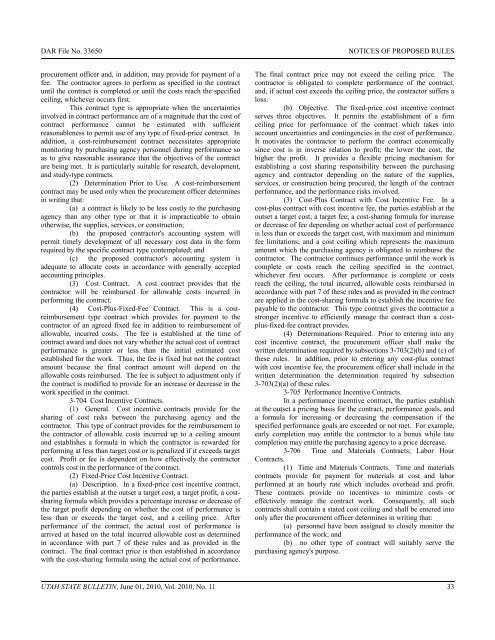
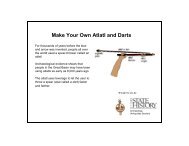

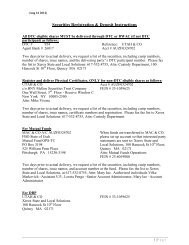
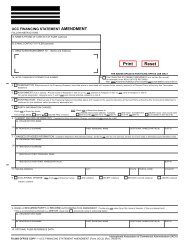
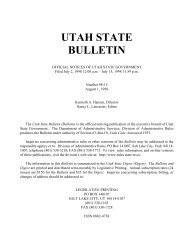
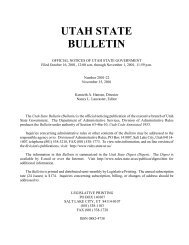


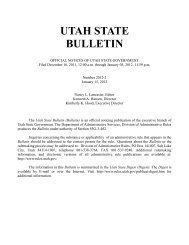
![Lynx avoidance [PDF] - Wisconsin Department of Natural Resources](https://img.yumpu.com/41279089/1/159x260/lynx-avoidance-pdf-wisconsin-department-of-natural-resources.jpg?quality=85)
